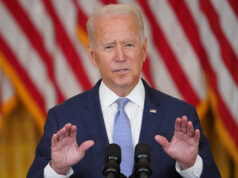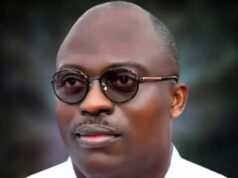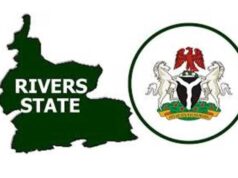President Muhammadu Buhari has won the 2019 presidential election polling 15,191,847 votes to defeat his closest challenger and former vice president, Atiku Abubakar of the Peoples Democratic Party.
Mr. Abubakar, who served as vice president between 1999 and 2007, polled 11,262,978 votes to finish as runner-up.
Mahmood Yakubu, the chairman of the Independent National Electoral Commission (INEC), declared Mr. Buhari the winner of the election and returned him as duly elected.
“I, Professor Mahmood Yakubu hereby certify that I was the returning officer for the election held on the 23rd of February, 2019.
“That Muhammadu Buhari having satisfied the requirements of the law, having scored the highest number of votes is hereby returned elected.”
Mr. Yakubu said the Certificate of Return would be issued to the winners later today, at 2 p.m.
It was a hard-fought victory for Mr. Buhari and his party, the All Progressives Congress (APC), after a rigorous political campaign that saw the 76-year old retired army general traverse the 36 state capitals as he sought much-needed re-election.
Before the announcement of the final results, the PDP had rejected the outcome saying the election was marred by disenfranchisement and manipulation of figures.
The party went ahead to urge the INEC to discontinue the announcement of the presidential election results.
But the ruling party described the opposition party’s reaction as “antics” to stop the INEC from completing this electoral process.
There were, indeed, election violence in several parts of the country with injuries and fatalities recorded in Lagos, Rivers, Kano, Kogi, Zamfara, Anambra, Ogun, among other states.
At least, 47 people died from election-related violence recorded across more than eight states in the country, according to the Situation Room, a coalition of more than 70 civil society groups.
But the violence notwithstanding, Mr. Buhari was able to win in 19 states, securing the statutorily required 25 percent of votes cast in 24 or more of the 36 states. He won in Kaduna, Jigawa, Niger, Yobe, Gombe, Kogi, Nasarawa, Kwara, Osun, Ekiti, Bauchi, Lagos, Ogun, Kano, Katsina, Borno, Sokoto, Kebbi, and Zamfara states.
Mr. Abubakar prevailed 17 states and the FCT. The opposition candidate won in Anambra, Ebonyi, Enugu, Abia, Ondo, Adamawa, Taraba, Oyo, Edo, Benue, Imo, Plateau, Cross River, Akwa Ibom, Delta, Bayelsa, Rivers, and the FCT.
There were 73 presidential candidates on the ballot in an election marred by low voter turnout (35.7 percent; less than the 44 percent recorded in 2015), but the contest was between Mr. Buhari and Mr. Abubakar. For the latter, and at 72, it will probably be his last shot at the presidency after previous unsuccessful attempts.
But it will be another opportunity for the president to redeem his badly battered persona as a no-nonsense anti-corruption champion as well as position the economy on a sound fiscal footing. Several corruption trials against politically-exposed persons have stalled in courts across the country and Mr. Buhari continued to be accused of shielding some of his inner circle who are allegedly corrupt from prosecution.
The two front-runners are also northerners and Muslims. While Mr. Buhari is from the northwestern state of Katsina, Mr. Abubakar hails from Adamawa in the northeast.
Ahead of the polls, Mr Abubakar’s strategists predicted a solid outing for their principal, especially in the northwest and northeast – where Mr. Buhari traditionally garnered nearly all his votes in the three previous attempts before his eventual victory in 2015 – and then make a clean sweep of most of the southern states to bolster his numbers.
But at the end of voting, Mr. Buhari won in all the states in the northeast and northwest with the exception of Adamawa and Taraba states.
Mr. Buhari’s victory makes it the second time, since 1999, that an incumbent will be re-elected, after former president Olusegun Obasanjo’s successful attempt in 2003.
In 2015, the then president, Goodluck Jonathan, failed in his re-election bid after he was defeated by Mr. Buhari.
Premiumtimes



